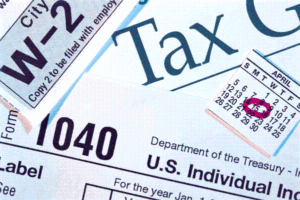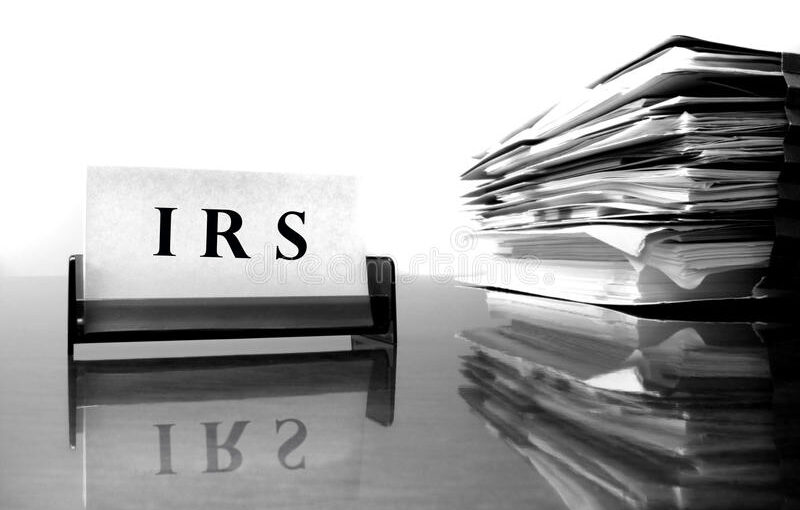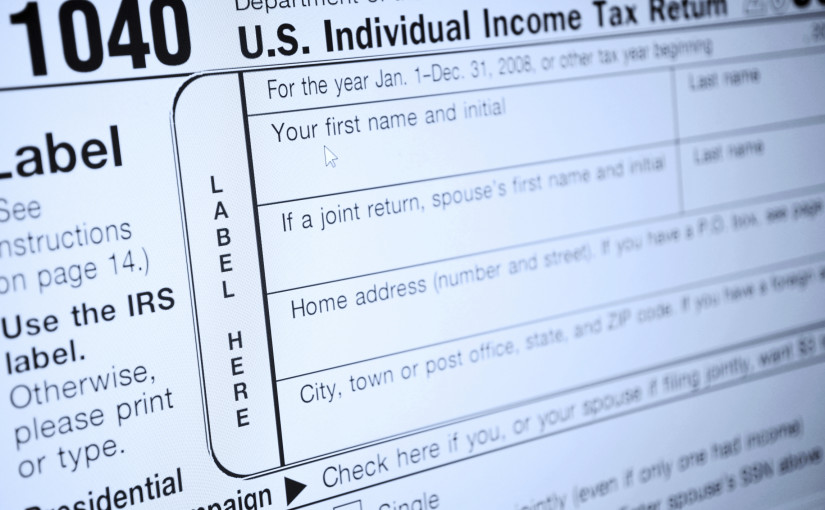Tax season is fast approaching and tax payers are finding that the IRS customer service is lacking. Michael Hiltzik for the Los Angeles Times suggests that the blame may not be on the organization itself but on the federal government who has repeatedly cut funding for the agency. In the last thirty years the tax payer base has grown from 254 million people, collecting $1.1 trillion in revenue to 330 million people now dealing with over $3.5 trillion. During this time, the staff at the IRS has been cut by almost 30,000 and over the last decade, “the agency’s budget has declined by 20% in inflation-adjusted terms.” According to statistics published by the IRS National Taxpayer Advocate, last year only 11% of calls to the agency were answered. What does this mean for the IRS and the general taxpayer? Read more here: Don’t blame the IRS for its lousy service. Blame Congress
Tag: taxes
Handling Tax Season Stress
Start Early
Break It Up
Know Your Options
Think Ahead
Sounds simple, right? A large percentage of tax payers wait until the last minute which leads to increased stress and lack of time to adequately review tax documents. If you need help, you should always ask a professional. We are here for you at Newby CPA. Call us today! 512 484 8016
Checkout more tips for a smooth tax season here:
Tips to Tackle Tax Season Costs and Stress
Tax Return Questions? We’ve Got Answers!
2020 was a wild year. Many collected unemployment, received government stimulus checks, and worked from home, which brings a multitude of questions as tax filing season approaches. Tara Siegel Barnard for the New York Times offers answers to the most pressing tax inquiries and shares tips on how to save money. From teachers to retirees to charitable giving and student loans, she covers the bulk of current issues when filing your return. How the Pandemic Has Changed Your Taxes Need more help? Contact Debra at 512 484 8016.
Tax Time is Coming Soon!
 It’s time to start gathering forms and data for your 2020 tax returns, if you haven’t already. This time of year you may have many questions about your taxes, but one of the most important things to monitor is your withholding. Ever had a surprise tax bill that caused you financial hardship? The best way to avoid this is by checking your withholding every year. For more information on the right amount for you based on various factors, visit https://www.irs.gov/pub/irs-pdf/p5349.pdf and try their Withholding Estimator today! For all your other tax questions contact me, Debra Newby Watkins, CPA, 512 484 8016.
It’s time to start gathering forms and data for your 2020 tax returns, if you haven’t already. This time of year you may have many questions about your taxes, but one of the most important things to monitor is your withholding. Ever had a surprise tax bill that caused you financial hardship? The best way to avoid this is by checking your withholding every year. For more information on the right amount for you based on various factors, visit https://www.irs.gov/pub/irs-pdf/p5349.pdf and try their Withholding Estimator today! For all your other tax questions contact me, Debra Newby Watkins, CPA, 512 484 8016.
Selling Marijuana, Don’t Forget to Pay Your Taxes
 The IRS has dedicated a page on its website to Marijuana sales. Many states have approved the drug for medical uses and some for recreational use, but banks are still discouraged from doing business with these dispensaries and transactions are often made in cash. Even though, just as other consumables, marijuana is subject to taxation and the IRS wants to make it clear to businesses what is expected for paying taxes.
The IRS has dedicated a page on its website to Marijuana sales. Many states have approved the drug for medical uses and some for recreational use, but banks are still discouraged from doing business with these dispensaries and transactions are often made in cash. Even though, just as other consumables, marijuana is subject to taxation and the IRS wants to make it clear to businesses what is expected for paying taxes.
From the site: “The IRS understands this is a new and growing industry and provided frequently asked questions about record keeping, cash payment options, large cash amounts, and other related topics to help promote voluntary compliance in the industry,” said the IRS. “In addition to this page, the IRS also offers a wealth of general small business guidance and resources on IRS.gov.” Want to know more? Visit https://www.accountingtoday.com/news/irs-adds-marijuana-industry-page-to-website
Paying Taxes on Crypto Currency?
 Do you owe taxes on crypto currency? Chances are you’re safe if you have no idea what that is, although some parents were unaware that their high-school and college aged children were trading in Bitcoin. The IRS is currently cracking down on tax evaders with digital holdings through two versions of a warning letter. The first implying the tax payer may have no knowledge of these accounts, and the second enforcing a deadline for recipients to disclose all of their crypto transactions or risk legal recourse. Accounting Today suggests the best ways to handle these tax situations based on the type of letter received in the article, Crypto tax avoiders face IRS roulette: Fess up or try to hide .
Do you owe taxes on crypto currency? Chances are you’re safe if you have no idea what that is, although some parents were unaware that their high-school and college aged children were trading in Bitcoin. The IRS is currently cracking down on tax evaders with digital holdings through two versions of a warning letter. The first implying the tax payer may have no knowledge of these accounts, and the second enforcing a deadline for recipients to disclose all of their crypto transactions or risk legal recourse. Accounting Today suggests the best ways to handle these tax situations based on the type of letter received in the article, Crypto tax avoiders face IRS roulette: Fess up or try to hide .
Getting the Most Out of Your Education
![]() Did you know that by including certain scholarships as income you might be able to increase your education credit, reduce your total tax, or increase your tax refund? The key is finding awards that may be used for other expenses such as books, or room and board.
Did you know that by including certain scholarships as income you might be able to increase your education credit, reduce your total tax, or increase your tax refund? The key is finding awards that may be used for other expenses such as books, or room and board.
For detailed instructions on determining what kinds of grants and scholarships are eligible and how to apply these for best tax savings, see Maximizing the higher education tax credits: Including a scholarship in gross income can sometimes save on taxes in the Journal of Accountancy.
Go Tax Paperless
 Ready to ditch your file cabinet? Explore going paperless with your tax documents. A great start is organizing your files using a document scanner. Many of these have wifi capabilities and function as part of your at-home network. Shredding old paper documents helps protect against identity theft.
Ready to ditch your file cabinet? Explore going paperless with your tax documents. A great start is organizing your files using a document scanner. Many of these have wifi capabilities and function as part of your at-home network. Shredding old paper documents helps protect against identity theft.
Once your scanning is complete, create one file on your computer to hold these documents. Be sure to back-up your documents in more than one place, such as on a flash drive, external drive, or a personal cloud. Experts suggest keeping these files for up to seven years. Make collecting this information easy by tracking receipts and invoices with simple budgeting apps and watch the clutter in your home office disappear. Want to learn more? Click here: How to Go Paperless in Your Home Office
How The Younger Set Lives
 Millennials are getting the raw end of the deal. Both state and national policies tend to favor the older and more affluent. Medicare costs often outweigh money paid in taxes by those who benefit, and programs that support higher education have been cut, leaving students with more debt. The millennials of our country have flat incomes and wealth is down.
Millennials are getting the raw end of the deal. Both state and national policies tend to favor the older and more affluent. Medicare costs often outweigh money paid in taxes by those who benefit, and programs that support higher education have been cut, leaving students with more debt. The millennials of our country have flat incomes and wealth is down.Spend More Make Less?
 The IRS outsourced tax collection in an effort to “put a dent in the $138 billion that taxpayers owe the government.” This action cost the agency $20 million and netted a little over six million in past due monies. Combined with contractor payments and relatively low collection rates, other cost factors included the streamlined approval of “tax-exempt organizations” as well as lack of funding for better direct (IRS) communication with tax payers.
The IRS outsourced tax collection in an effort to “put a dent in the $138 billion that taxpayers owe the government.” This action cost the agency $20 million and netted a little over six million in past due monies. Combined with contractor payments and relatively low collection rates, other cost factors included the streamlined approval of “tax-exempt organizations” as well as lack of funding for better direct (IRS) communication with tax payers.


